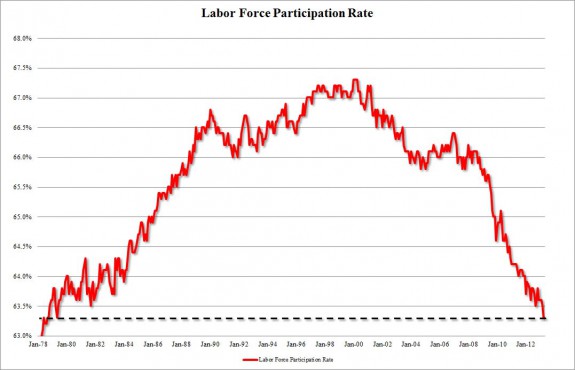The U.S. economy created an estimated 165,000 jobs in April, while March’s disappointing data was updated to reflect the creation of an additional 50,000 jobs and February’s data was updated to reflect an additional 64,000 new positions. The end result? A 7.5 percent rate – down from last month’s 7.6 percent imprint.
Still, the nation’s labor participation rate remained at a 34-year-low of 63.3 percent – meaning millions of working age Americans remain on the sidelines of an economy that is struggling to find its footing despite trillions of dollars in government “stimulation” over the past five years.
In fact take a look at this thoroughly depressing chart from our friends over at Zero Hedge …
(Click to enlarge)
Chart: Zero Hedge
Ouch …
“There is little that can be learned about the direction of the economy from the tepid April unemployment report,” observed Bill Wilson, president of the pro-free market group Americans for Limited Government. “The modest job growth combined with the lowest labor participation rate since 1981 may be the new normal under Obama policies that punish job creation. The good news is that in spite of these government headwinds exemplified by Obamacare’s costly penalties on hiring, the number of private sector jobs increased by 176,000 while economic growth sucking government jobs decreased by 11,000.”
Wilson added that “demand for labor is increasing, but employer uncertainty about the long term prospects of the economy are impinging a commitment to growth.”
He’s absolutely right …
The only good news about the report? A modest improvement in the job market should (for now, at least) decrease the volume from those demanding additional government spending, lending and money-printing.
APRIL 2013 EMPLOYMENT SITUATION REPORT (.pdf)
***



8 comments
The graph you’re showing conveniently cuts off where it does. If you look back into the early 70’s, the 60’s, and the 50’s, 1979 was a record high in labor participation rate.
Let’s do a little math. Baby boomers were born between 1946 and 1964, let’s add 25 years to account for them growing up and graduating. That turns into 1971-1989. Wow, that’s about when the labor participation rate started rising dramatically! Let’s add 30 years on top of that (total age: 55) to account for employment and assume they retire after that due to saving for retirement/getting a pension. 2001-2019, albeit many people may work beyond the 30 years (and some may work less). 2001? Isn’t that when the labor participation rate began to drop steadily? What about Social Security or those who wait a bit to retire? Age 62-65, right? 2008-2026/2011-2029.
Take all of this into account when you figure that the recession hit in full swing in 2008, within the retirement/pension year range and at the very beginning of the SS retirement range. Also imagine being someone who wants to work more, but due to the massive layoffs, extended length of unemployment, possible drop-kicking of their credit, and their increased age, it is difficult to reenter the workforce, especially due to the large competition that high unemployment brings. Are we surprised some people just say “fuck it” and retire?
What influence the Baby Boomers had on bolstering the labor participation rate, they are going to have a similar effect on when they exit the workforce (minus those who pass away before retiring or didn’t contribute to the workforce anyways). If you have a temporary population boom that is followed up by far lower birth rates on a more constant basis, you’re going to see a fluctuation in a lot of things.
http://www.washingtonpost.com/blogs/wonkblog/wp/2012/11/29/graphs-of-the-day-part-ii-u-s-birthrate-falls-to-lowest-on-record/
The labor participation rate says a lot of things about the condition America is in, but you’re boiling it down into something far simpler than it actually is. Labor participation rates are expected to further decline regardless of recovery:
Because of this, the Federal Reserve Bank of Chicago expects the labor force participation rate to be lower in 2020 than it is today, regardless of how well the economy does.
In a March report titled “Dispelling an Urban Legend,” Dean Maki, an economist at Barclays Capital, found that demographics accounted for a majority of the drop in the participation rate since 2002.
http://www.washingtonpost.com/blogs/wonkblog/post/the-incredible-shrinking-labor-force/2012/05/04/gIQANXAy1T_blog.html
No wonder. If you look at the math above, by 2020 a large percentage of baby boomers will likely be retired. The recession may have caused some of them to retire early, and on a smaller budget (that hurts us too).
Don’t confuse Right wingers with facts. It makes their brains hurt, if they have one.
What pisses me off is that you know Bill Wilson has a smug little smirk on his face when he opines “Hurr durr! New normal under Obamuh!” I’m sure deep down Wilson understands the nature behind the declining labor participation rates, that it started before and will outlast Obama’s presidency regardless of what actions are taken, but god forbid he let a good opportunity go to waste and not get the stupids up in a frenzy over something that takes very little thinking capacity to debunk.
It doesn’t matter how big government is or who is in charge or what is being done, you can’t smooth a bump in the road of this magnitude. Baby Boomers affect a lot more than just labor participation rates.
The graph you’re showing conveniently cuts off where it does. If you look back into the early 70’s, the 60’s, and the 50’s, 1979 was a record high in labor participation rate.
Let’s do a little math. Baby boomers were born between 1946 and 1964, let’s add 25 years to account for them growing up and graduating. That turns into 1971-1989. Wow, that’s about when the labor participation rate started rising dramatically! Let’s add 30 years on top of that (total age: 55) to account for employment and assume they retire after that due to saving for retirement/getting a pension. 2001-2019, albeit many people may work beyond the 30 years (and some may work less). 2001? Isn’t that when the labor participation rate began to drop steadily? What about Social Security or those who wait a bit to retire? Age 62-65, right? 2008-2026/2011-2029.
Take all of this into account when you figure that the recession hit in full swing in 2008, within the retirement/pension year range and at the very beginning of the SS retirement range. Also imagine being someone who wants to work more, but due to the massive layoffs, extended length of unemployment, possible drop-kicking of their credit, and their increased age, it is difficult to reenter the workforce, especially due to the large competition that high unemployment brings. Are we surprised some people just say “fuck it” and retire?
What influence the Baby Boomers had on bolstering the labor participation rate, they are going to have a similar effect on when they exit the workforce (minus those who pass away before retiring or didn’t contribute to the workforce anyways). If you have a temporary population boom that is followed up by far lower birth rates on a more constant basis, you’re going to see a fluctuation in a lot of things.
http://www.washingtonpost.com/blogs/wonkblog/wp/2012/11/29/graphs-of-the-day-part-ii-u-s-birthrate-falls-to-lowest-on-record/
The labor participation rate says a lot of things about the condition America is in, but you’re boiling it down into something far simpler than it actually is. Labor participation rates are expected to further decline regardless of recovery:
Because of this, the Federal Reserve Bank of Chicago expects the labor force participation rate to be lower in 2020 than it is today, regardless of how well the economy does.
In a March report titled “Dispelling an Urban Legend,” Dean Maki, an economist at Barclays Capital, found that demographics accounted for a majority of the drop in the participation rate since 2002.
http://www.washingtonpost.com/blogs/wonkblog/post/the-incredible-shrinking-labor-force/2012/05/04/gIQANXAy1T_blog.html
No wonder. If you look at the math above, by 2020 a large percentage of baby boomers will likely be retired. The recession may have caused some of them to retire early, and on a smaller budget (that hurts us too).
Don’t confuse Right wingers with facts. It makes their brains hurt, if they have one.
What pisses me off is that you know Bill Wilson has a smug little smirk on his face when he opines “Hurr durr! New normal under Obamuh!” I’m sure deep down Wilson understands the nature behind the declining labor participation rates, that it started before and will outlast Obama’s presidency regardless of what actions are taken, but god forbid he let a good opportunity go to waste and not get the stupids up in a frenzy over something that takes very little thinking capacity to debunk.
It doesn’t matter how big government is or who is in charge or what is being done, you can’t smooth a bump in the road of this magnitude. Baby Boomers affect a lot more than just labor participation rates.
It’s not the jobs that matter. It’s the paychecks.
Dark side to jobs report: Big drop in hours worked
Commentary: Shorter work week equivalent to 500,000 jobs lost
http://www.marketwatch.com/story/dark-side-to-jobs-report-big-drop-in-hours-worked-2013-05-03?dist=lcountdown
It’s not the jobs that matter. It’s the paychecks.
Dark side to jobs report: Big drop in hours worked
Commentary: Shorter work week equivalent to 500,000 jobs lost
http://www.marketwatch.com/story/dark-side-to-jobs-report-big-drop-in-hours-worked-2013-05-03?dist=lcountdown